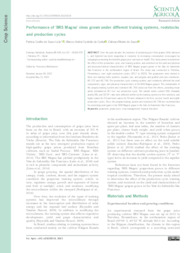Performance of BRS Magna vines grown under different training systems, rootstocks and production cycles.
Performance of BRS Magna vines grown under different training systems, rootstocks and production cycles.
Author(s): LEÃO, P. C. de S.; CUNHA, M. A. C. da; SOUZA, E. R. de
Summary: Over the past decade, the business of producing juice from grapes (Vitis labrusca L. and hybrids) has been expanding in response to increasing consumption encouraged by campaigns promoting the benefits grape juice can have on health. This study aimed to determine the effect of the production cycle, vine training system, and rootstock on the yield and physical and physical-chemical characteristics of ?BRS Magna? grapes grown in the Vale do Submédio São Francisco in the northeastern region of Brazil. The study was conducted in Petrolina, Pernambuco, over eight production cycles (2017 to 2020). The grapevines were trained in three vine training trellis systems: espalier, lyre, and pergola; and grafted onto two rootstocks: IAC 572 and IAC 766. The production cycle, training system, and rootstocks affected the yield components, vigor, and physical characteristics of the BRS Magna grapes. The combination of the pergola training system and rootstock IAC 766 stood out from the others, providing mean yields estimated at 26 t ha?1 per production cycle. The soluble solids content (SS), titratable acidity (TA), and SS TA?1 ratio were affected neither by the training system nor the rootstock, and higher values for SS and lower values for TA were obtained in the first, second, fourth and eighth production cycles. Thus, the pergola training system and rootstock IAC 766 are recommended for promoting yield gains in the ?BRS Magna? grape in the Vale do Submédio São Francisco.
Publication year: 2023
Types of publication: Journal article
Unit: Embrapa Semi-arid Region
Observation
Some of Embrapa's publications are published as ePub files. To read them, use or download one of the following free software options to your computer or mobile device. Android: Google Play Books; IOS: iBooks; Windows and Linux: Calibre.
Access other publications
Access the Agricultural Research Database (BDPA) to consult Embrapa's full library collection and records.
Visit Embrapa Bookstore to purchase books and other publications sold by Embrapa.

